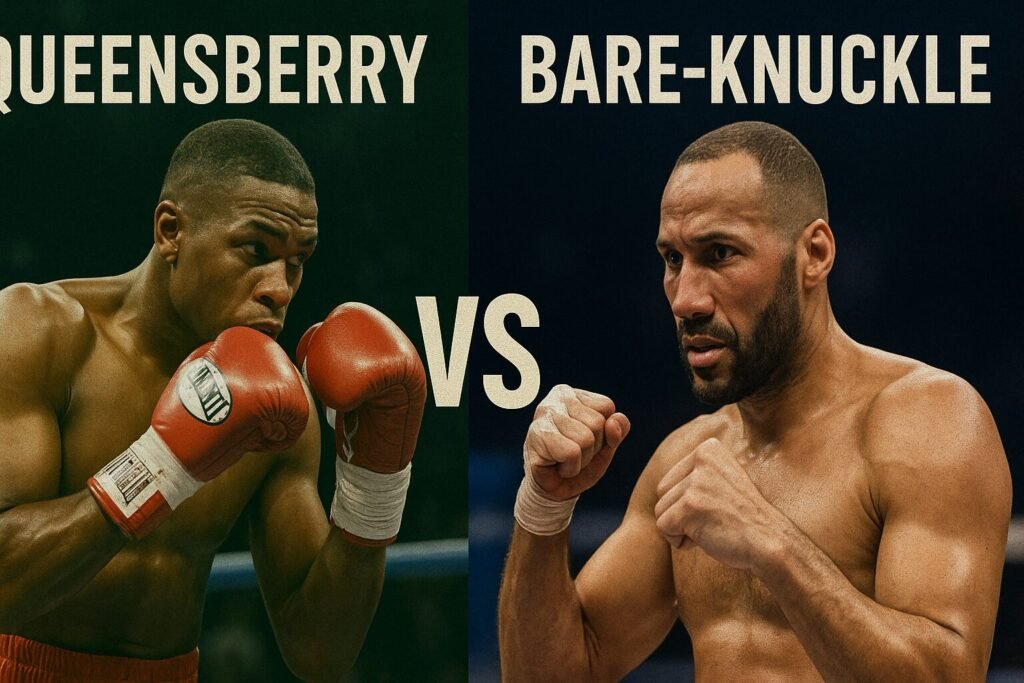James DeGale once stood at the top of the boxing world — an Olympic gold medallist, a two-time world champion, and one of Britain’s most decorated fighters of his era. Yet this past weekend, fans weren’t watching him under the bright lights of the O2 or Madison Square Garden. Instead, they saw him step into the unforgiving world of bare-knuckle boxing under the BKFC banner.
The debut was messy. Fouls, penalties, and all sorts of roughhouse tactics played out. But, as usual, people noticed. Which begs the question — why would a fighter of DeGale’s calibre return to combat this way? And what does it tell us about the rise of bare-knuckle?
Queensbury Rules vs Bare-Knuckle: Worlds Apart
It’s worth spelling out just how different bare-knuckle is compared to the sport DeGale built his legacy on:
- Gloves vs fists: In Queensbury rules, 8–10oz gloves cushion impact (a little). Bare-knuckle strips it back to wraps and knuckles. Cuts are almost guaranteed.
- Round length: Professional boxing typically has three-minute rounds. Bare-knuckle usually runs shorter, two-minute bursts — designed for fast violence.
- Defence: Gloves double as shields. Without them, parrying and head movement matter more, but damage adds up quicker.
- Refereeing: Traditional boxing has clear foul systems. Bare-knuckle? The line between “rough” and “illegal” is blurred, and we saw that in DeGale’s debut.
- Strategy: In boxing, you can set traps, build pressure, and play the long game. Bare-knuckle favours the brawler. It’s brutal, chaotic, and doesn’t reward patience.
These aren’t small tweaks. They’re completely different sports wearing the same coat.
Why DeGale? Why Now?
DeGale retired in 2019 after a punishing loss to Chris Eubank Jr, leaving the game with his health and reputation intact. So why risk it all now?
Some say it’s about money. Others think it’s about scratching that competitive itch that never quite goes away. For DeGale, who spent years chasing legacy under the Queensbury rules, bare-knuckle offers nothing to add to his résumé. If anything, it risks taking away.
Because here’s the truth: a bare-knuckle win doesn’t make you a better boxer. And a bare-knuckle loss can leave fans questioning what’s left in the tank. For someone like DeGale — a fighter already enshrined in British boxing history — the risk feels heavier than the reward.
The Crossover Question
We’ve seen it before. MMA fighters crossing into boxing. Boxers going to MMA. Influencers selling PPVs. Now, bare-knuckle is the latest playground.
But is this crossover culture elevating the sport, or just cheapening it? On the one hand, it brings eyeballs and headlines. On the other, it blurs legacies. When fans talk about DeGale in ten years, will they remember the slick southpaw who became Britain’s first Olympic gold medallist to win a world title — or the man taking punches without gloves in a smaller arena?
It’s the tension boxing has yet to solve: entertainment versus honour.
My Take
Look, I get the itch. Fighters miss fighting. The crowd loves violence. But there’s a difference between controlled sport and glorified street brawling — and bare-knuckle sits dangerously close to the latter. Traditional boxing moved away from fist-only contests for a reason: gloves are not just tradition, they’re harm-mitigation. They reduce cuts, they disperse force — imperfectly, yes — but they were introduced precisely to protect fighters and to allow a sport to develop technique, tactics and longevity. When you strip that away you don’t just change the look of a fight — you change the cost of it.
Medical science isn’t glamorous copy for clickbait: repeated head trauma, the risk of severe facial cuts, jaw fractures, and the acceleration of chronic brain injury all rise when bare knuckles are involved. Short bursts of savage violence might be entertaining in a highlight reel, but the long game is grim. A late-career fighter like DeGale stands to trade decades of earned legacy for a single payday and a headline. That’s not noble; it’s transactional — and potentially permanent in the worst possible way.
Then there’s the rules and the refereeing. Modern boxing evolved exacting rulebooks, licensing, medical checks and insurance because sport demanded standards. Bare-knuckle promotions often operate in a grey area: different rule sets, looser enforcement, and, crucially, a theatrical tolerance for “dirty tactics” that would get you fined or suspended in Queensbury rings. When fans cheer or shrug at fouls and wrestling, you start to normalise behaviour that in any other combat sport is unacceptable. That’s not progress. It’s a step back.
Which brings us to the blunt truth: what separates a sanctioned bare-knuckle event from a Friday-night street fight is almost nothing more than a ring, a commission that turns a blind eye, and a PPV stream. If you remove gloves, relax enforcement, and reward brutality with money and attention, you’ve created a legalised street fight with spectator seats. That’s not a compliment to fight culture — it’s the commodification of random violence.
Finally, there’s the ethical argument. Fans — and promoters — love a comeback story. But we have to ask who gets to decide if a fighter’s legacy is worth the risk. Medical teams and commissions exist to protect fighters from themselves sometimes. If a rule or a ban was introduced to protect people, putting a celebrated former world champion back into a bare-knuckle ring shouldn’t be framed as brave or daring; it should raise red flags. If we let reputation and money override safety standards, boxing’s duty of care erodes and the sport becomes something darker.
Over to You
What do you think — is bare-knuckle the future of crossover combat, or just another circus act that drags boxing’s name down? Drop your thoughts in the comments, share this post with your mates, and head over to CMBoxing.co.uk for more opinion, debate, and boxing talk every day.

